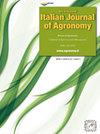How to intensify collaboration in a participatory modelling process to collectively design and evaluate new farming systems
IF 2.6
3区 农林科学
Q1 AGRONOMY
引用次数: 1
Abstract
Agricultural research is expected to foster agro-ecological transitions. For that purpose, methodologies of participative integrated assessment of new farming and cropping systems are requested. However, the territory level and the stakeholders’ participation are often not sufficiently embraced. Based on the companion modeling approach, a group of researchers from different disciplines experimented an approach where researchers and stakeholders collaborated intensively all along the process of design and use of the model. The researchers selected a small rural area where agriculture plays a major role (Valensole plateau, south of France) and where they had not carried out any investigation before. In such conditions, we argue that the interactions between researchers and stakeholders involved in the co-design from scratch of a simulation model stimulate a collective reflection about the sustainability of current and alternative farming systems. This article describes the different phases of the process from stakeholders’ enrolment until the final discussion of the results provided by the model. It underlines the conditions that favored the emergence of consensus and the production of a new set of knowledge. It emphasizes how the discordances between data and disagreements between stakeholders were used to stimulate collective debates and underlines the role played by the model. Finally, the article discusses the drawbacks that the approach did not overcome.如何在参与式建模过程中加强合作,共同设计和评估新的耕作制度
农业研究有望促进农业生态转型。为此,需要对新的耕作和种植系统进行参与式综合评估。然而,地区层面和利益相关者的参与往往不够充分。在同伴建模方法的基础上,一组来自不同学科的研究人员尝试了一种方法,在设计和使用模型的整个过程中,研究人员和利益相关者都进行了深入合作。研究人员选择了一个以农业为主的小农村地区(法国南部瓦朗索莱高原),在此之前,他们从未对该地区进行过任何调查。在这种情况下,我们认为,研究人员与参与共同设计模拟模型的利益相关者之间的互动,激发了对当前和替代农业系统可持续性的集体思考。本文介绍了从利益相关者参与到最终讨论模型结果的不同阶段。文章强调了有利于达成共识和产生一系列新知识的条件。文章强调了如何利用数据之间的不一致和利益相关者之间的分歧来激发集体辩论,并强调了模型所发挥的作用。最后,文章讨论了该方法未能克服的缺点。
本文章由计算机程序翻译,如有差异,请以英文原文为准。
求助全文
约1分钟内获得全文
求助全文
来源期刊

Italian Journal of Agronomy
AGRONOMY-
CiteScore
4.20
自引率
4.50%
发文量
25
审稿时长
10 weeks
期刊介绍:
The Italian Journal of Agronomy (IJA) is the official journal of the Italian Society for Agronomy. It publishes quarterly original articles and reviews reporting experimental and theoretical contributions to agronomy and crop science, with main emphasis on original articles from Italy and countries having similar agricultural conditions. The journal deals with all aspects of Agricultural and Environmental Sciences, the interactions between cropping systems and sustainable development. Multidisciplinary articles that bridge agronomy with ecology, environmental and social sciences are also welcome.
 求助内容:
求助内容: 应助结果提醒方式:
应助结果提醒方式:


